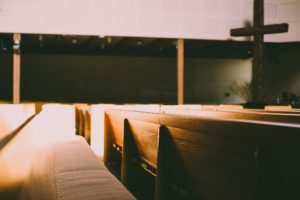JOURNEYS TO HUMANISM | Seeking Marriage Counseling, Finding Humanism
 Photo by Gregory Hayes on Unsplash
Photo by Gregory Hayes on Unsplash Journeys to Humanism, theHumanist.com’s regular series, features real stories from humanists in our community. From heartwarming narratives of growth, to more difficult journeys, our readers open up about their experiences coming to humanism.
Stephanie Parker
Corbin, KY
In 2021, I walked into my Baptist church and asked for help with my marriage. That began a long and painful walk out of Christianity and into humanism.
At the time, I had a number of big life events taking place (family member death, birth of a child, home selling/buying, and caretaking of a grandparent) and I was experiencing some very distressing physical symptoms (later attributed to PTSD). I had just come to terms with the patterns in my marriage being a contributing factor in my distress. A decade earlier my husband and I had been recommended to a local pastor for counseling after disclosing an act of physical violence. I was encouraged to pray more, submit more… be better. I’d win him to the Lord or at the very least, my suffering would earn me rewards in heaven.
Ten years later, I had nothing to show for my best efforts but a mental health crisis and my faith in shambles. I sat with my pastor and confessed the most recent event that I felt would help him understand what I was dealing with—a fight that led to my husband’s fist positioned at my face.
“But he didn’t actually hit you?”
“Nope.”
My pastor and people around me would say things like:
“But that’s good, for a man”
“We won’t help you unless you prove you are trying”
“Your husband should have been the one speaking”
“But what might you have done to cause this?”
The situation was a mess of chaos. Every pastor and leader just added more and more on top of it all. I walked away with none of the community or prayer or support that I envisioned.
But I did meet some great people, great Christians. And for a while, I thought that was the answer. God had a plan, he was teaching me something through this, I was developing my character. But it didn’t always make sense. I wanted to know God, his love and his grace. I was trying to trust God, and I desperately needed community. But somehow I was more alone than I’d ever been. And eventually I realized that there had been no god in any of it. I’d decided what I needed and I found people that would offer those things and used that to confirm the bias I already had toward a god.
When I stepped back, I realized that people do bad and hurtful things and people do beautiful and loving things, and the belief in a god more often resulted in people bringing harm and refusing to take ownership of their actions. I’d hear, “they only needed God’s forgiveness,” or “hurtfulness is evidence of a lack of faith,” or lastly, “their god told them to behave that way.”
I felt like my head was being split into two. I was trying to keep my worldview of God as good and loving in the face of a reality that gave no evidence of that or his realness at all. I finally accepted that and moved to atheism. Atheism was merely the absence of a belief but it didn’t satisfy my desire for a worldview.
 I adopted humanism because it allowed me to love others without all the conditions. I didn’t have to constantly assess who was adhering to the religious traditions properly, who was reading the Bible most accurately, or who was the most credible voice for all that “God” thought, believed, wanted. I had a better sense of community because there was no “us” and “them” …everyone was just united in their humanity. I get to learn and grow without fearing that it’s the “enemy tempting” me away from god. I don’t have to worry when my loved ones die that they are suffering in hell and I failed to lead them to Jesus so they could go to heaven.
I adopted humanism because it allowed me to love others without all the conditions. I didn’t have to constantly assess who was adhering to the religious traditions properly, who was reading the Bible most accurately, or who was the most credible voice for all that “God” thought, believed, wanted. I had a better sense of community because there was no “us” and “them” …everyone was just united in their humanity. I get to learn and grow without fearing that it’s the “enemy tempting” me away from god. I don’t have to worry when my loved ones die that they are suffering in hell and I failed to lead them to Jesus so they could go to heaven.
My mental health improved.
And my marriage, after a decade of chaos, improved as well. My husband gave me space and made an effort to hear me out once we got away from the conservative culture that asks nothing of men but makes women responsible for every “sin” both as the cause and as the ones that need to stop it or forgive it without question. We learned how to communicate—as actual people—and found that we actually enjoyed one another when we ditched all the religious baggage and rules.
Humanism > Christianity
We all have our own stories of how we came to be humanists, and we want to hear yours! Fill out the form here to be featured in this series. You can also share your journey and chat with others on the Journeys to Humanism channel on the AHA’s Discord Server.
